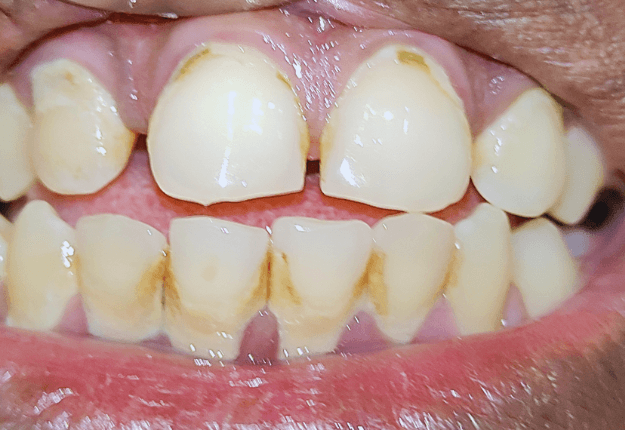
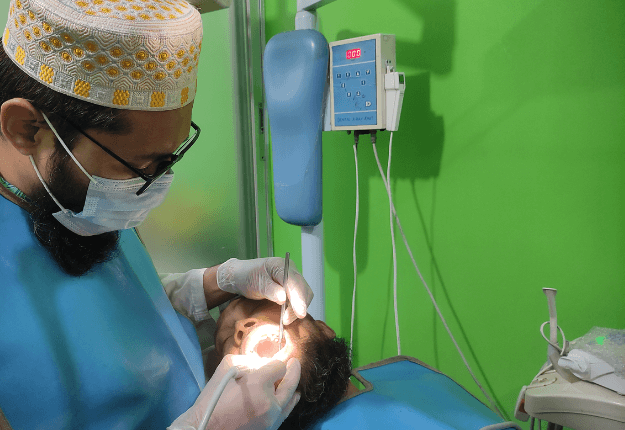
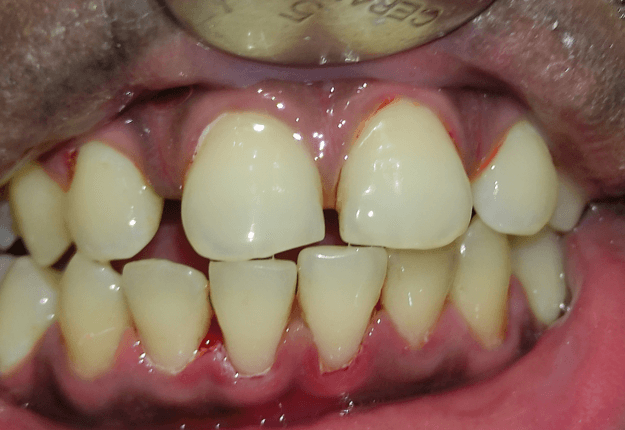
“Why Do My Teeth Feel Sticky?” has become a common question for everyone nowadays. Have you ever wondered why your teeth sometimes feel coated and you can’t just brush them off?
This is known as sticky teeth, an interesting yet often ignored part of dental health.
I am Dr. Emda, BDS, an oral and dental surgeon. I also feel this stickiness on my teeth sometimes. But it is relatively easy to solve the problem.
In my post, I will discuss all the Causes, Prevention, and Treatment of Sticky Teeth. Let’s dive into the full article.
Table of Contents
Why Do My Teeth Feel Sticky? Understanding The Causes:
“Why Do My Teeth Feel Sticky?” is your common question, right? Experiencing a sticky sensation on your teeth can be puzzling and sometimes concerning. This feeling is often a sign that something is affecting your oral health. Let’s explore the various reasons why your teeth might feel sticky.
1. Sugary Foods and Beverages:
One of the most common culprits for sticky teeth is the consumption of sugary foods and drinks.
When sugar lingers on your teeth, it becomes a feast for oral bacteria. These bacteria produce acids as they digest the sugar. Thus, it leads to the formation of a sticky film known as plaque. This plaque adheres to the teeth, creating that sticky sensation.
Over time, if not properly cleaned, this plaque can harden into tartar or calculus. This tartar or calculus is a rough substance. This substance further contributes to the feeling of stickiness.
2. Acidic Foods and Drinks:
Acidic substances found in sodas, citrus fruits, and certain candies make teeth sticky. Contribute to sticky teeth. Enamel is the hardest part of our body that protects the outer layer of our teeth. But these acids can erode the enamel, leading to a roughened surface.
This roughness can make your teeth feel sticky. Your teeth feel sticky because there’s more space for bacteria and plaque to stick to them.
3. Poor Oral Hygiene:
Inadequate brushing and flossing are significant factors in the development of sticky teeth. Without regular and proper cleaning, food particles, bacteria, plaque, and tartar can stick to your teeth. This buildup creates a sticky layer that feels unpleasant. This layer also causes damage to your teeth and gums.
4. Dry Mouth (Xerostomia):
Saliva is a very important substance that maintains your oral health. It helps clean away food bits and balances the acids that bacteria make.
However, certain conditions can reduce saliva production, leading to Dry Mouth (Xerostomia). These conditions are medication side effects, medical disorders, and lifestyle choices. A dry mouth lacks the natural cleansing effect of saliva. Thus, it causes the teeth to feel sticky.
5. Eating Sticky Foods:
It’s clear, but eating sticky foods such as caramels, honey, or syrups can leave a coating on your teeth. These things stick to your teeth and are hard to clean. This is why your teeth can feel sticky.
6. Not Drinking Enough Water:
Drinking enough water is really important for keeping your teeth healthy. When you drink water, it washes away bits of food from your teeth. It also makes the acids in your mouth less strong. If you don’t drink enough water, your mouth can get dry. Dry mouth makes it easier for food and sugar to stick to your teeth.
7. Gum Disease:
Plaque is a sticky biofilm that forms under the gum line. It can cause Gum Disease called periodontitis. This condition can cause inflammation and infection in the gums, called gingivitis. These diseases can, in turn, make your teeth feel sticky, especially near the gum line.
8. Cavities:
Cavities are caused by tooth decay. These cavities occur when acids from plaque erode the tooth enamel. This decay can create rough spots or even holes in the teeth, leading to a sticky sensation.
9. Health Conditions:
Certain diseases, such as diabetes, can affect your oral health. These conditions can alter the balance of bacteria in your mouth. Thus, these diseases affect saliva production. Compromised saliva production leads to a sticky feeling on your teeth.
10. Certain Medications:
Many common medications can reduce saliva production in your mouth. These medications include some for allergies, depression, high blood pressure, and anxiety. You know that saliva is super important because it helps keep your mouth moist. It also cleans away food particles and bacteria and neutralizes harmful acids.
11. Smoking and Alcohol Consumption:
Both smoking and excessive alcohol use can lead to dry mouth. Dry mouth is a condition where there is less saliva to keep the mouth moist. A dry mouth can feel sticky as it lacks the saliva needed to cleanse the teeth.
Understanding these causes is crucial for maintaining good oral hygiene and overall health. To avoid sticky teeth, going to a dental professional is important. Brush with a good toothbrush and fluoride toothpaste. Also, use dental floss and plaque remover. This helps a lot. Proper diet and adequate hydration are also essential for the prevention of stickiness. These are all the keys to preventing sticky teeth.
Why Do My Teeth Feel Sticky? Understanding The Prevention:
Are you worried about your teeth stickiness? Never fear for it. I am Dr. Emda, BDS is here with a simple guide that everyone, especially young folks, can follow.
1. Understand the Cause:
Firstly, it’s important to know why teeth can feel sticky. Usually, it’s because of the food and drinks we consume. Things like candy, soda, and even some fruits leave sugar on your teeth. Bacteria in your mouth love sugar, creating acids that make your teeth feel coated and sticky.
If it is from certain food and drinks, the condition will be called plaque. And you can easily examine it at home by learning “How to Spot Plaque.” But if the stickiness is not for plaque accumulation, consult a dentist immediately.
Regular maintenance of oral hygiene will help you prevent the teeth from sticking. You can do it with a Toothbrush, Toothpaste, Mouthwash, Plaque Remover dental floss, etc.
2. Brush Regularly:
The easiest and most effective step is brushing your teeth twice a day. Use a toothbrush that feels comfortable in your hand and mouth. Make sure your toothpaste contains Fluoride, as it helps strengthen your teeth. And Fluoride fights against cavities.
3. Floss Daily:
Many people need to remember about flossing, but it’s crucial. Flossing is effective for cleaning. The use of dental floss removes food and plaque. You can find this food and plaque between teeth. This is where a toothbrush can’t reach. This reduces the chance of feeling that sticky sensation.
4. Use Plaque or Tartar Remover:
You may use Plaque or Tartar Remover at home for better results. But before using it, please read the manual carefully. It would help if you learned the way to use it very carefully. You may consult a dentist if you have sensitive teeth or gums or any other oral conditions.
5. Stay Hydrated:
Drinking water is great for your overall health and your teeth. Water washes away food particles and dilutes the acids produced by bacteria. Try to drink water after eating, especially if you can’t brush your teeth right away.
6. Chew Sugar-Free Gum:
If you don’t brush your teeth after eating, chewing sugar-free gum is a good alternative. It stimulates saliva production. This saliva naturally cleans your teeth and helps reduce the sticky feeling. But brush at least one time at bedtime.
7. Regular Dental Checkups:
Visit your dentist regularly. They can spot problems early and give you advice specific to your dental health. Professional cleaning removes plaque and tartar that contribute to the sticky feeling.
8. Use Mouthwash:
Antibacterial Mouthwash can reduce the bacteria that cause plaque. It’s an extra step in your oral care routine that can make a big difference.
9. Eat Teeth-Friendly Foods:
Apples, carrots, and celery types of food can help regular dental cleanings naturally. They also boost saliva production. Saliva is natural for teeth cleaning. Thus, this saliva keeps your teeth clean.
10. Educate Yourself and Others:
Understanding and sharing knowledge about oral health is vital. The more you know, the better you can take care of your teeth and avoid that sticky feeling.
11. Quit Smoking:
If you smoke, consider quitting. Smoking not only harms your overall health but also affects your oral health, contributing to dry mouth and sticky teeth.
12. Consider Over-the-Counter Remedies:
There are over-the-counter products like mints and sprays containing xylitol that can stimulate saliva flow. These can be especially helpful if you have a condition like dry mouth.
Stop sticky teeth with good mouth care. Brush and floss often. Eat less sugar. Drink plenty of water. Schedule an appointment to visit a dentist. These steps keep your smile healthy and not sticky.
Why Do My Teeth Feel Sticky? The Treatment:
I have discussed the preventive measures for the stickiness of your teeth. Now, I am going to give some treatments for the stickiness of teeth. The preventive measures and the treatment are almost the same. By the way, here are some treatment options for your sticky teeth.
1. At-Home Remedies:
Oral Hygiene:
The cornerstone of treating sticky teeth is maintaining excellent oral hygiene. Practice good oral hygiene. You can do it by brushing your teeth twice a day with fluoride toothpaste. It would be best if you also floss daily. This can help you to remove plaque and food particles. These plaque and food particles contribute to the sticky sensation.
Dietary Changes:
To tackle the problem of sticky teeth, one of the simplest things you can do is cut down on sugary foods. Sugar-rich foods tend to stick to your teeth and create that unpleasant feeling. Also, it’s a good idea to eat fewer starchy foods.
Starch, like sugar, can cling to your teeth and add to the stickiness. By eating less of these, you’ll likely notice your teeth feeling less sticky. These foods contribute to plaque formation, which leads to a sticky feeling. Try healthier snacks like fresh fruits and vegetables
Fluoride Toothpaste:
Use fluoride toothpaste to strengthen tooth enamel and prevent decay.
Mouthwash:
You can use an antibacterial mouthwash. This Mouthwash can help reduce the bacteria in your mouth that cause plaque. Rinse with Mouthwash once or twice a day after brushing.
Chewing Sugar-Free Gum:
Chew sugar-free gum. Chewing this gum can increase saliva production. This saliva helps to clean your teeth and remove the sticky feeling naturally.
Hydration:
Drinking plenty of water is essential. It helps wash away food particles and sugar from the teeth, reducing stickiness. Additionally, a well-hydrated mouth maintains a healthy level of saliva. Minerals from your saliva provide natural protection against tooth decay and gum disease.
Avoiding Tobacco Products:
Smoking or using tobacco products can worsen oral health problems. These problems include dry mouth. A dry mouth can contribute to the sensation of sticky teeth. Quitting these habits can improve oral health significantly.
Limit Snacking:
Snacking often can lead to more plaque on your teeth. This is especially true if you eat lots of sugary or acidic foods. These kinds of snacks make it easier for plaque to form and build up on your teeth. So, eating them a lot can make this problem worse. Try to limit snacks and brush your teeth or rinse your mouth after snacking.
2. DIY Solutions and Natural Remedies:
Baking Soda:
Brush with baking soda gently. This can help remove plaque and neutralize acids.
Oil Pulling:
If you swish coconut or sesame oil in your mouth, it can help you in a couple of ways. Doing this for a few minutes every day can cut down on the bacteria in your mouth. Less bacteria means less plaque, which is the stuff that sticks to your teeth and can cause problems. So, using these oils can be a good way to keep your teeth cleaner and healthier.
Salt Water Rinse:
Rinsing with a saltwater solution can soothe irritated gums and cleanse the mouth.
3. Professional Dental Treatments:
Regular Dental Checkups:
They can also identify any dental issues contributing to the problem. Thus, they provide specific treatments.
Regular Cleanings:
Visiting your dentist regularly (at least twice a year) is crucial. Your hygienist can remove the plaque or tartar smoothly. These cleanings include removing tartar and plaque that regular brushing can’t.
Fillings:
If a tooth cavity is the cause of sticky teeth, fillings may be necessary to restore the teeth.
Fluoride Treatments:
If you visit your dentist about sticky teeth, they might suggest fluoride treatments. These treatments make your teeth stronger. Strong teeth are less likely to get cavities. When your teeth are stronger, they also feel less sticky. So, Fluoride can help prevent tooth decay and reduce that sticky feeling.
Dental Sealants:
Dentists can use sealants to protect your teeth. They put these sealants on the grooves of your teeth. This helps stop plaque and decay from building up there. The sealants act like a shield, keeping your teeth safe from these problems. By using sealants, your teeth will be healthier for longer.
Why Do My Teeth Feel Sticky? Managing Underlying Health Issues:
Sometimes, sticky teeth can be a symptom of underlying health issues. I have described them below.
Adjustments in Medication:
Some medications can cause dry mouth, which contributes to sticky teeth. You can see your healthcare provider about adjusting your medication.
Treating Systemic Diseases:
Diseases like diabetes can affect oral health. Managing these conditions can help reduce oral health problems.
Hydration:
Drink plenty of water that can alleviate dry mouth symptoms and reduce stickiness.
If your teeth still feel sticky even after trying these tips, it’s a good idea to see your dentist. Your dentist can examine carefully your teeth to find out what’s going on. They might have special treatments or ideas that are just right for you. Everyone’s teeth are different so you might need something special. Going to the dentist can help with sticky teeth. Also, taking good care of your teeth every day is important. This helps stop sticky teeth from happening in the first place.
Why Do My Teeth Feel Sticky? Symptoms and Associated Conditions:
Identifying Sticky Teeth:
Texture and Sensation:
Sticky teeth feel like there is something on your teeth that stays there even after you brush. Your teeth might feel like they have a coating or a film over them. This feeling can be more noticeable after eating sugary or starchy foods.
Related Symptoms:
Bad Breath:
When your teeth feel sticky, you might also notice that your breath doesn’t smell so good. This is because the same stuff that makes your teeth sticky can also cause bad breath.
Tooth Discoloration:
Sometimes, sticky teeth can start to look a bit yellow or stained. Sometimes, sticky teeth can start to look a bit yellow or stained. This happens because the sticky stuff on your teeth can grab colors from the food and drinks you have.
When to Seek Professional Help:
Persistent Symptoms:
If your teeth keep feeling sticky no matter how much you brush, it’s a sign that something’s not right. This is more true when you do other good things. For example, when you floss regularly. And when you eat healthy foods. These small actions make a big difference.
Pain or Discomfort:
If your sticky teeth start to hurt or cause discomfort, it’s time to see a dentist. Pain may be a sign of a bigger problem, like cavities or gum disease, that needs to be treated by a dentist.
Remember, sticky teeth can be more than just annoying; they can be a sign that your teeth need a little extra care. If you’re noticing these symptoms, it’s a good idea to talk to your dentist. They can help figure out what’s causing the stickiness and give you advice on how to fix it.
How Harmful is Dental Plaque Buildup to My Health?
Dental plaque is an adhesive, colorless film that forms on your teeth. It’s full of bacteria, and if you don’t clean it off, it can be bad for your teeth and gums. In this article, we’ll talk about why dental plaque is harmful and what you can do about it.
Why is Plaque Bad for Your Teeth?
Cavities:
The bacteria in plaque create acids when they eat the sugars in your mouth. These acids can make holes in your teeth, known as cavities.
Gum Disease:
If plaque stays on your gums, it can make them red, swollen, and bleed. This is called gum disease. Plaque forms on teeth and bleeding gums occur due to infection.
Bad Breath:
Plaque can cause bad breath because the bacteria in it can have a strong smell.
Plaque and Your Overall Health:
Having a lot of plaque isn’t just bad for your mouth. It can also affect your overall health. Here’s how:
Heart Disease:
Some research has found that the bacteria in your mouth might enter your blood. When this happens, these bacteria could be connected to heart problems. This means that keeping your mouth clean might help keep your heart healthy, too.
Diabetes:
If you have diabetes, you cannot control your blood sugar levels. As a result, diabetes worsens gum disease.
Other Health Issues:
Taking care of your gums can help prevent other health issues. Problems like strokes may be more likely if you have gum disease. Also, if your gums are unhealthy, you could be more at risk for rheumatoid arthritis. This arthritis is a joint condition. So, it’s really important to keep your gums healthy.
Why Do My Teeth Feel Sticky? Debunking Common Myths and Separating Facts from Fiction in Oral Health:
I am an oral and dental surgeon. So, I often come across various myths and misconceptions about oral health. This is especially true regarding the issue of sticky teeth. In this part of the article, I’ll address some of these myths. I also provide factual information to help you better understand your oral health.
Debunking Common Myths:
Myth:
Sticky Teeth Are Always Caused by Eating Sugary Foods.
Reality:
While sugary foods can contribute to sticky teeth, they are not the only cause. There are several reasons why your teeth might feel sticky. Not taking good care of your teeth is one of them. Also, having certain health problems can make your teeth sticky. And sometimes, the medicines you take for other things can cause your teeth to feel this way, too. So, it’s not just about the foods you eat; other things matter, too.
Myth:
Sticky Teeth are Harmless and Don’t Need Attention.
Reality:
Sticky teeth can be a sign of plaque buildup, which, if ignored, can lead to cavities and gum disease. It’s important to address the issue and maintain good oral hygiene.
Myth:
Brushing Harder Removes Stickiness Better.
Reality:
Brushing too hard can damage your tooth enamel and irritate your gums. Gentle and thorough brushing is more effective and safer.
Facts vs. Fiction in Oral Health:
Fact:
Regular Dental Checkups are Essential.
Some people think you should only go to the dentist if you have a problem. But actually, seeing a dentist is important. Regular checkups can stop problems like sticky teeth before they start. They also help keep your whole mouth healthy. So, it’s a good idea to visit your dentist often, not just when something is wrong.
Fiction:
Chewing Gum Can Replace Brushing.
Sugar-free gum chewing can be good for your mouth. It helps make more saliva, which cleans your teeth. But brushing and flossing are better. Brushing and flossing are important to keep your teeth clean. So, even if you chew gum, remember to brush and floss, too.
Fact:
Diet Affects Oral Health.
The myth that what you eat doesn’t impact your teeth is misleading. The right foods are essential for healthy teeth. Try to eat less sugar and foods that are acidic. These kinds of foods can make your teeth sticky. So, having a balanced diet helps stop this and keeps your teeth in good shape. Eating well is important for your oral health.
Fiction:
Only Children Get Sticky Teeth.
Sticky teeth can happen to anyone, no matter how old they are. It’s not just a problem for kids. Adults can get sticky teeth, too. This is especially true if they need to take better care of their teeth. Also, if adults have other health problems, they might get sticky teeth more easily. So, everyone needs to look after their teeth.
Knowing the truth about taking care of your teeth is very important. This knowledge helps keep your mouth healthy and avoid problems like sticky teeth. If you want the best advice, it’s a good idea to talk to a dentist. They can give you information that’s just right for you. And remember, having a healthy mouth is a big part of being healthy all over.
Why Do My Teeth Feel Sticky? The Future of Dental Care:
Being a dentist, I’m excited about the future of dental care. This is especially true when it comes to dealing with common issues like sticky teeth. Let’s explore some of the advances in dentistry and how they’re changing the way we take care of our oral health.
Advances in Dentistry:
New Treatments and Technologies:
Dentistry is always changing and getting better. New ways to treat teeth and new tools for dentists are coming out all the time. For instance, the stuff used for fillings is getting better. These new fillings look more like real teeth, and they last longer, too.
Plus, there are new kinds of coatings for teeth. These coatings help stop plaque from building up. This means there’s less chance of getting sticky teeth. So, as time goes on, we have more and better ways to take care of our teeth.
Digital Dentistry:
Digital technology is making dental care more precise and less invasive. With digital X-rays and 3D imaging, dentists can get a better view of your teeth and gums. This helps in accurately diagnosing and treating problems like plaque buildup. This plaque can cause teeth to feel sticky.
Laser Dentistry:
Dentists are now using lasers for different kinds of treatments on teeth. These lasers are good at getting rid of plaque and tartar. This helps make your teeth less sticky. They also use lasers to treat gums. This is great because it doesn’t hurt as much, and you get better faster. So, using lasers is a cool new way to make dental care easier and quicker.
Preventive Care and Education:
Emphasis on Prevention:
In the future, dentists will focus a lot on stopping tooth problems before they happen. This means you need to go to the dentist regularly for checkups and cleanings. These visits are really important. They help stop plaque from building up on your teeth, which keeps them from feeling sticky. So, to avoid tooth troubles, it’s good to see your dentist often.
Educational Resources:
Nowadays, dentists are putting more effort into teaching people about teeth care. They show you the right way to brush and floss. They also tell you how eating healthy foods is good for your teeth. Learning these things helps you keep your mouth clean and healthy. So, knowing how to care for your teeth properly is important.
Customized Care Plans:
Dentists these days have better ways to take care of each person’s specific tooth needs. If you often have problems like sticky teeth, your dentist can make a special plan just for you. This plan will help stop and fix the issue of sticky teeth. So, your dentist can give you exactly the kind of care that’s best for your teeth.
Collaborative Healthcare:
Dentists are teaming up more with other health experts. This teamwork is really important. The health of your mouth is linked to your body’s overall health. For example, if you have a condition like diabetes, it can impact your mouth. It might even make problems like sticky teeth more likely.
When dentists work with other health doctors, they can take better care of you. They look after not just your teeth but also your whole body’s health. This means they help you stay healthy in every way. So, it’s really good when your dentist and other doctors work together.
The future looks good for taking care of teeth. There are new technologies and a big focus on stopping problems before they start. Dentists are also teaching more about how to take care of your teeth. All this makes going to the dentist better and easier for everyone. It’s important to keep going to your dentist often and to take good care of your teeth at home. Doing this helps stop your teeth from feeling sticky and keeps your smile healthy.
To sum up, it’s really important to know why your teeth feel sticky. This stickiness can mean plaque is building up on your teeth. If you don’t take care of it, you could get cavities or gum disease. Brush and floss your teeth twice daily for the prevention of plaque.
Also, eating healthy foods helps a lot. Remember that going to the dentist often is really important for keeping your teeth clean.
As a dentist, I always tell people to take care of their teeth. I also advise them to ask a dentist for help if their teeth keep feeling sticky. By doing these things, you’ll have a healthier mouth and a nicer smile. Good tooth care is a big part of staying healthy overall.
FAQs on “Why Do My Teeth Feel Sticky”:
As I am an oral and dental surgeon, I know you may have some questions on sticky teeth. Here are the questions and answers.
Question: Can I ask you (Dr. Emda BDS) any questions regarding dental problems?
Answer: Yes. You can ask me any dental-related questions through the comment box below. When I will be free, I will try to answer you. You must write your name & your country’s name. Thanks.
Question: What is Plaque?
Answer:
Plaque is a soft, sticky biofilm. This can build up on your teeth. It’s full of bacteria and is the main reason your teeth might feel sticky. Plaque is colorless in appearance. It forms when food combines with saliva and bacteria in your mouth. The sugary or starchy items are more responsible for plague formation. Brush at least twice a day to get rid of stickiness due to plaque stuck.
Question: How to Spot Plaque?
Answer:
Here is the technique of spotting the plaque:
- Look for a Fuzzy Feeling: Run your tongue over your teeth. If they feel fuzzy or filmy, that’s often plaque.
- Brush it: Check if the sticky feeling goes away after brushing. If it does, it is likely plaque; if not, it’s something else.
- Visible Buildup: Look closely at your teeth, especially near the gum line. Plaque can look like a pale yellow coating.
- Use Disclosure Tablets: These are chewable tablets that color the plaque on your teeth, making it easier to see. They’re safe and can be fun to use – they turn your teeth into different colors to show where you need to brush more!
- Observe the flow of saliva: If the flow is normal, it is plaque; if it’s increased or decreased, consult a dentist.
Question: What do you mean by sugary foods and drinks in the stickiness of teeth?
Answer:
Foods and drinks containing a lot of sugar, like candies and sodas, can be harmful to your teeth. When you eat or drink these, the sugar sticks to your teeth. This sugar is food for bacteria in your mouth. These bacteria make acids from the sugar. These acids can damage the hard surface of your teeth and cause holes known as cavities. The hard surface of your teeth is called enamel.
If you keep eating or drinking sugary things, your teeth can cause more problems. It’s very important to brush and floss your teeth to clean off the sugar and keep your teeth healthy. Taking care of your teeth every day helps stop the bad effects of sugar.
List of common sugary foods and drinks:
- Candy: Especially sticky or gummy candies that cling to the teeth.
- Soda: Both regular and diet sodas can be acidic and sugary.
- Pastries and Cakes: These often contain high levels of sugar.
- Sweetened Breakfast Cereals: Many cereals, especially those marketed to children, are high in sugar.
- Cookies and Biscuits: These snacks can contain a lot of sugar.
- Fruit Juices: Even though they’re natural, juices can be high in sugar.
- Ice Cream: It’s a sweet treat that’s high in sugar.
- Sports Drinks: Often contain more sugar than you might expect.
- Sweetened Yogurts: Especially flavored varieties.
- Jams and Jellies: High in sugar and stick to the teeth easily.
- Dried Fruit: Natural sugars become concentrated and sticky when fruit is dried.
- Honey and Syrups: Natural sweeteners, but still high in sugar.
Eating a balanced diet is crucial for keeping your teeth healthy. This means including foods that are good for your teeth and limiting those that are not. It’s not just about what you eat but also how you take care of your teeth.
Brushing and flossing type oral hygiene is the key to preventing it from being sticky. Sticky teeth can lead to dental problems. So it’s important to clean your teeth well after eating. This helps to avoid issues like cavities and tooth decay. Thus, it keeps your teeth strong and healthy. Dental checkup and cleaning is also crucial.
Question: What do you mean by Acidic substances in the stickiness of teeth?
Answer:
Some foods and drinks are acidic, meaning they have a low pH. Acidic things can make your teeth sticky. When your teeth are sticky, more bacteria can stick to them. These bacteria can hurt the hard surface of your teeth, called enamel. This can start tooth decay, which is when holes form in your teeth. So, it’s important to be careful with acidic foods and drinks to keep your teeth healthy.
Here’s a list of common acidic substances that can affect teeth:
- Citrus Fruits: Oranges, lemons, limes, and grapefruits.
- Soda: Both regular and diet varieties.
- Wine: Red and white wines.
- Sports Drinks: Many are surprisingly acidic.
- Tomatoes: Including sauces, juices, and ketchup.
- Vinegar: Found in salad dressings and marinades.
- Pickles: Due to the vinegar used in the pickling process.
- Yogurt: Especially the flavored varieties.
- Coffee: Natural acidity can affect teeth.
- Tea: Certain types, especially fruit teas and those with added flavors.
Acidic foods and drinks can weaken the enamel of teeth. Thus, this food makes it vulnerable to damage. Poor oral hygiene increases the risk of erosion and cavities. Balancing your diet and practicing good dental care are essential for maintaining healthy teeth.
Question: What do you mean by Gum Disease?
Answer:
Gum disease is a problem that can hurt your gums and the bones that hold your teeth. It begins when plaque, a sticky film, builds up at the base of your teeth. There are different levels of gum disease. The first level, gingivitis, makes your gums red, swollen, and easy to bleed. If it gets worse, it turns into periodontitis. This can make your teeth fall out.
When gum disease gets bad, your gums can pull away from your teeth, creating spaces that get infected. Your body tries to fight this infection, but it can damage the bones and tissues that keep your teeth in place. Brushing your teeth well and seeing a dentist often can help prevent gum disease.
Question: What do you mean by Dry Mouth (Xerostomia)?
Answer:
Have you ever woken up with a parched feeling in your mouth, almost as if you’ve been walking in a desert? That’s dry mouth for you. It is medically known as xerostomia. Dry mouth happens when your salivary glands don’t produce enough saliva. Understanding it is crucial as it plays a vital role in your oral health and comfort.
Causes of Dry Mouth:
- Dehydration: The most straightforward cause. Are you not drinking enough water? Your mouth will likely tell you.
- Medications and Medical Conditions: Numerous medications, from antihistamines to blood pressure drugs have side effects. These side effects include dry mouth. Certain medical conditions like diabetes and Sjogren’s syndrome also contribute to this symptom.
- Lifestyle Factors: Smoking, chewing tobacco, or even breathing with your mouth open can dry out your oral cavity.
Symptoms and Diagnosis of Dry Mouth:
- Dry mouth isn’t just about feeling thirsty. It includes symptoms like a sticky mouthfeel, bad breath, and difficulty swallowing. If these symptoms persist, it’s time to consult a healthcare provider. They might conduct saliva tests or review your medical history for a diagnosis.
Prevention Strategies:
- Prevention is about balance. Drink plenty of water, and reduce caffeine intake to prevent Dry Mouth. If you’re on medications known to cause dry mouth, consult with your doctor.
Treatment Options:
- There are many ways to deal with dry mouth. One way is to suck on sugar-free candies. These candies help make more saliva in your mouth. Another way is to use special mouth moisturizers. These moisturizers help keep your mouth from feeling too dry. So, you have different options to help with dry mouth. A doctor might prescribe medication that stimulates saliva production for more severe cases.
Impact on Daily Life:
- Dry mouth can affect how you enjoy your meals and even your speech. It also increases the risk of dental decay and gum disease.
Long-Term Management:
- Regular dental check-ups and good oral hygiene are your best friends. Additionally, lifestyle changes like quitting smoking can have a significant positive impact.
To take care of dry mouth, you need to do a few different things. First, you might have to change some of your daily habits. This includes things like what you eat and drink. Next, you might need some medical treatments. These can help make more saliva or treat the cause of your dry mouth.
Finally, you should do things to prevent dry mouth from getting worse. This means keeping your mouth clean and going to the dentist regularly. So, dealing with dry mouth involves a mix of changes, treatments, and prevention. Listen to your body, and don’t hesitate to seek professional advice when needed.
Question: Can sticky teeth lead to other dental problems?
Answer:
Yes, if not addressed, sticky teeth can lead to cavities and gum disease. The plaque that causes the stickiness can harm your teeth and gums over time.
Question: What do you mean by Tooth Decay or Dental Caries?
Answer:
Tooth decay starts when bacteria in your mouth turn sugar from your food into acids. These acids eat away at the enamel, causing small holes known as cavities. If you don’t treat these cavities, they can get bigger and deeper and hurt the inside of your tooth. This can cause pain and infection and even make you lose the tooth.
To avoid tooth decay, it’s important to clean your teeth well by brushing and flossing. You also need to eat less sugary and acidic foods to avoid it.
Question: How can I prevent my teeth from feeling sticky?
Answer:
Brush your teeth twice a day with a good quality brush. You need to floss daily. Intake sugary and starchy foods also. Drink water after meals. This can help wash away food particles.
Question: Is it necessary to see a dentist for sticky teeth?
Answer:
If your teeth often feel sticky, it’s a good idea to see a dentist. They can find any underlying issues and provide a professional cleaning to remove plaque.
Question: Can children also experience sticky teeth?
Answer:
Yes, children can experience sticky teeth, especially if they consume a lot of sugary snacks. It’s important to teach them good oral hygiene habits early on.
Question: Does drinking water help with sticky teeth?
Answer:
Yes, drinking water helps. It washes away food particles and sugars that can stick to your teeth and cause that sticky feeling.
Question: Are there specific foods that make my teeth feel more sticky?
Answer:
Foods high in sugar and starch, like candy, bread, and soda, can make your teeth feel more sticky because they leave more residue on your teeth.
Question: How often should I visit the dentist to prevent sticky teeth?
Answer:
I recommend you visit the dentist every six months for a checkup and cleaning. This can help prevent plaque buildup and sticky teeth.
Question: Can certain medical conditions cause sticky teeth?
Answer:
Yes, conditions like Dry Mouth, Diabetes can contribute to sticky teeth. Some medications can also cause dry mouth, leading to a sticky feeling.
Question: Is chewing gum a good solution for sticky teeth?
Answer:
Chewing sugar-free gum can help by increasing saliva flow, which cleans your teeth. However, it should be different from regular brushing and flossing.
Question: Why do my teeth feel sticky after eating sugary foods and drinks?
Answer:
When you eat or drink sugary items, the sugar adheres to your teeth and mixes with the bacteria in your mouth. This combination forms a sticky film called plaque. Plaque makes your teeth feel sticky. If it’s not cleaned off regularly, it can lead to more serious dental problems like cavities and gum disease. To keep your teeth from feeling sticky, it’s important to brush them regularly, especially after consuming sugary foods and drinks.
Question: Can I see plaque on my teeth?
Answer:
Sometimes, you can see it as a fuzzy layer, especially near your gums.
Question: Is plaque the same as tartar?
Answer:
No, tartar is a hardened plaque and can’t be removed by brushing alone. But plaque is a sticky film. It is soft. You can easily remove it by brushing. Food particles and saliva easily harden the plaque. Tartar buildup occurs after the formation of plaque that has hardened. A dental professional can remove the tartar easily. You can also remove it with an Electric Plaque Remover at home.
Question: Does Mouthwash help with plaque?
Answer:
Some Mouthwashes can help reduce plaque and keep your gums healthy.
Question: Do braces make it harder to keep plaque away?
Answer:
Braces can make cleaning your teeth more challenging, so it’s important to brush and floss carefully.
Question: What are Floss / Interdental Cleaners?
Answer:
According to the American Dental Association (ADA), Floss / Interdental Cleaners may be described with the following Key Points:
- “Interdental cleaning helps remove debris and interproximal dental plaque, the plaque that collects between two teeth; dental floss and other interdental cleaners help clean these hard-to-reach tooth surfaces and reduce the likelihood of gum disease and tooth decay.
- Use of an interdental cleaner (like floss) is an essential part of taking care of your teeth and gums; the U.S. Department of Health and Human Services reaffirmed flossing as “an important oral hygiene practice” in an August 2016 communication to the ADA.
- A company earns the ADA Seal of Acceptance by producing scientific evidence that demonstrates the safety and efficacy of its product, which the ADA Council on Scientific Affairs carefully evaluates according to objective requirements.” – ADA
Question: How to get rid of yellow teeth?
Off-white or yellow teeth can be bothersome, but there are simple ways to make them whiter. First, maintain proper oral hygiene. Brush your teeth twice a day and floss regularly. This keeps your teeth clean and removes plaque with Plaque Remover. Plaque can cause your teeth to turn yellow.
Watch what you eat and drink. Foods and drinks like coffee, tea, and soda can stain your teeth. Try to cut down on these and rinse your mouth with water after consuming them.
For a natural remedy, try mixing a little baking soda with water and gently brushing your teeth with it. But don’t do this too often, as it can be harsh on your enamel.
If these steps don’t help, you might want to visit a dentist. They can offer professional cleaning or whitening treatments that are more effective.
Remember, the key is to keep your teeth clean and avoid things that stain them.
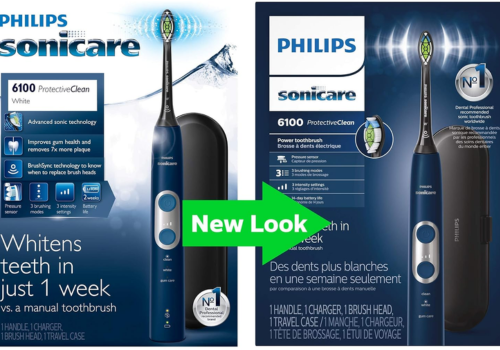
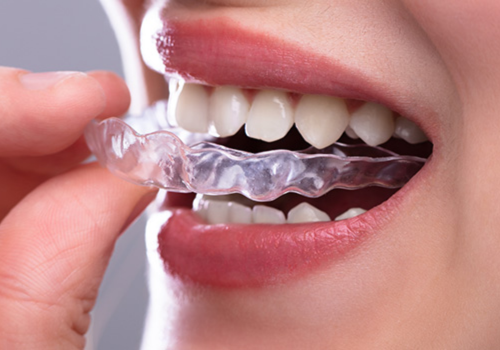
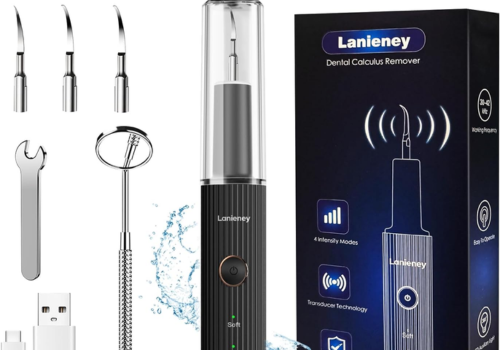
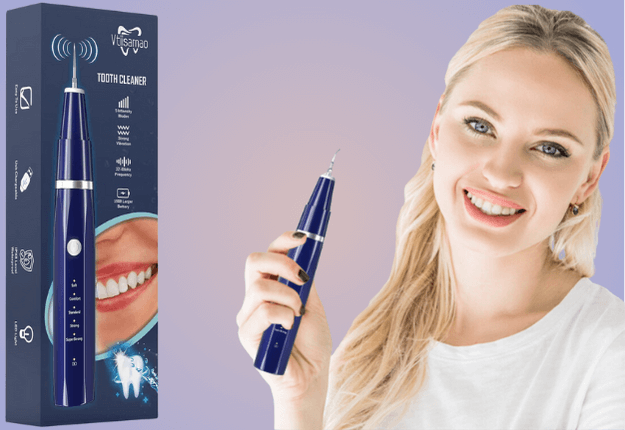

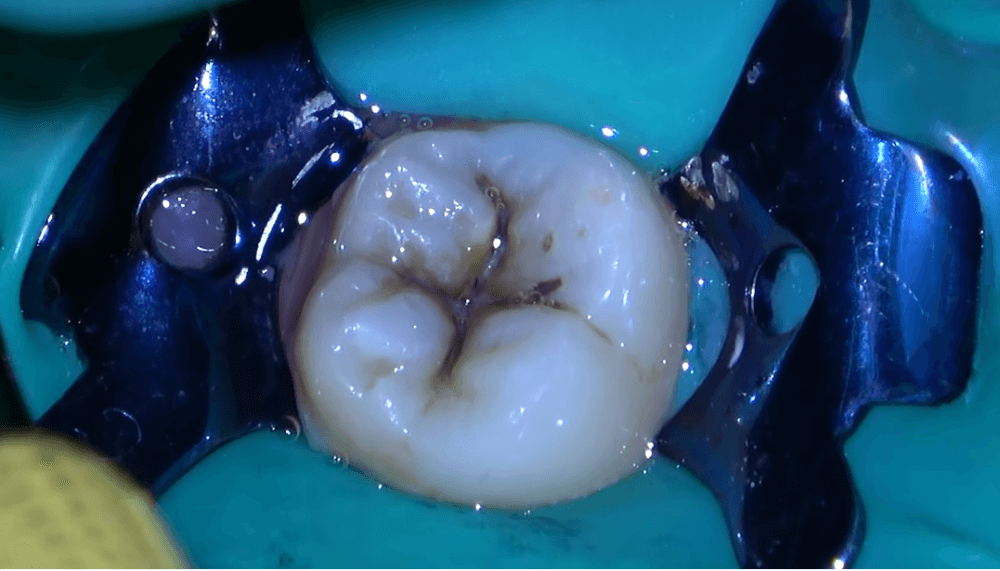
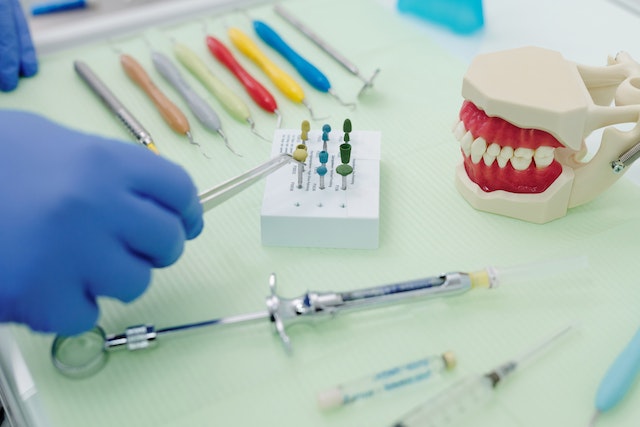
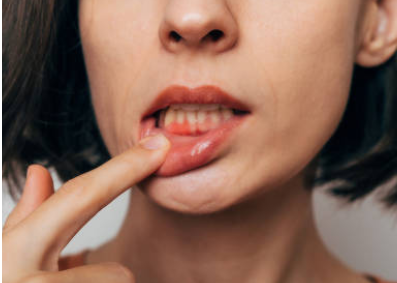
Leave a Reply